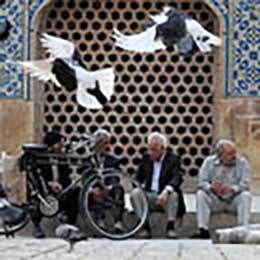
 the elementary school teacher Luis Soriano, and of four thousand eight hundred books begged together from various sources. Obviously only a small part of them moves around at every weekend on the mountain paths around the Columbian village of La Gloria, about which the yesterday article of the Spanish edition of the New York Times presenting the library says to be even more abandoned than Aracataca, the Macondo of Gabriel García Márquez’s Hundred years of solitude.
the elementary school teacher Luis Soriano, and of four thousand eight hundred books begged together from various sources. Obviously only a small part of them moves around at every weekend on the mountain paths around the Columbian village of La Gloria, about which the yesterday article of the Spanish edition of the New York Times presenting the library says to be even more abandoned than Aracataca, the Macondo of Gabriel García Márquez’s Hundred years of solitude.Soriano not only procures, carries and stores the books – in high piles along the wall, a practice not without risk in a home with three children –, but he also reads them aloud to his public: fairy tales to the children and adult literature for the illiterate. He makes efforts to keep the standard high, and he asks in letters the contemporary authors to send him copies of their works. His readers are already waiting for them, and – sure what is sure – they often learn by heart the poems from the volumes of contemporary poetry lent for only a week.
This part of Columbia is inflicted by guerilla wars, “but they are already not as violent as they were in my childhood” says reassuringly Soriano who had been once captured by one of the gangs. They found no money on him, so they finally took away only a book, the Brida by Coelho, says Soriano with a resigned grimace.
In my childhood the mobile library, an Ikarus bus painted in yellow and having bookshelves on the place of its seats came once a week, on Tuesday afternoon from four to eight to the worker’s colony Sibrik in Kőbánya, on the outskirts of Budapest. It brought books from the library in the suburb center where none of my classmates have ever been. But all of them stood there in the queue, waiting for the bookmobile from as early as three and a half – they could choose from the most interesting books in the order of arrival –, discussing the books they had read in the previous week, changing bibliographies, offering critical evaluations, establishing canons, appreciating authors, like in ancient Athens. After 1989 the bookmobile stopped to come. I wonder what the children of my classmates might read nowadays in the worker’s colony Sibrik.
When searching for the Biblioburros, I also found a video where the bookmobile just arrives to a mountain ranch. The children are leafing the books, the master sets to read a fable. And lo, is that not a rhinoceros, at minute one, seconds twenty-seven?
























































































































































Add comment